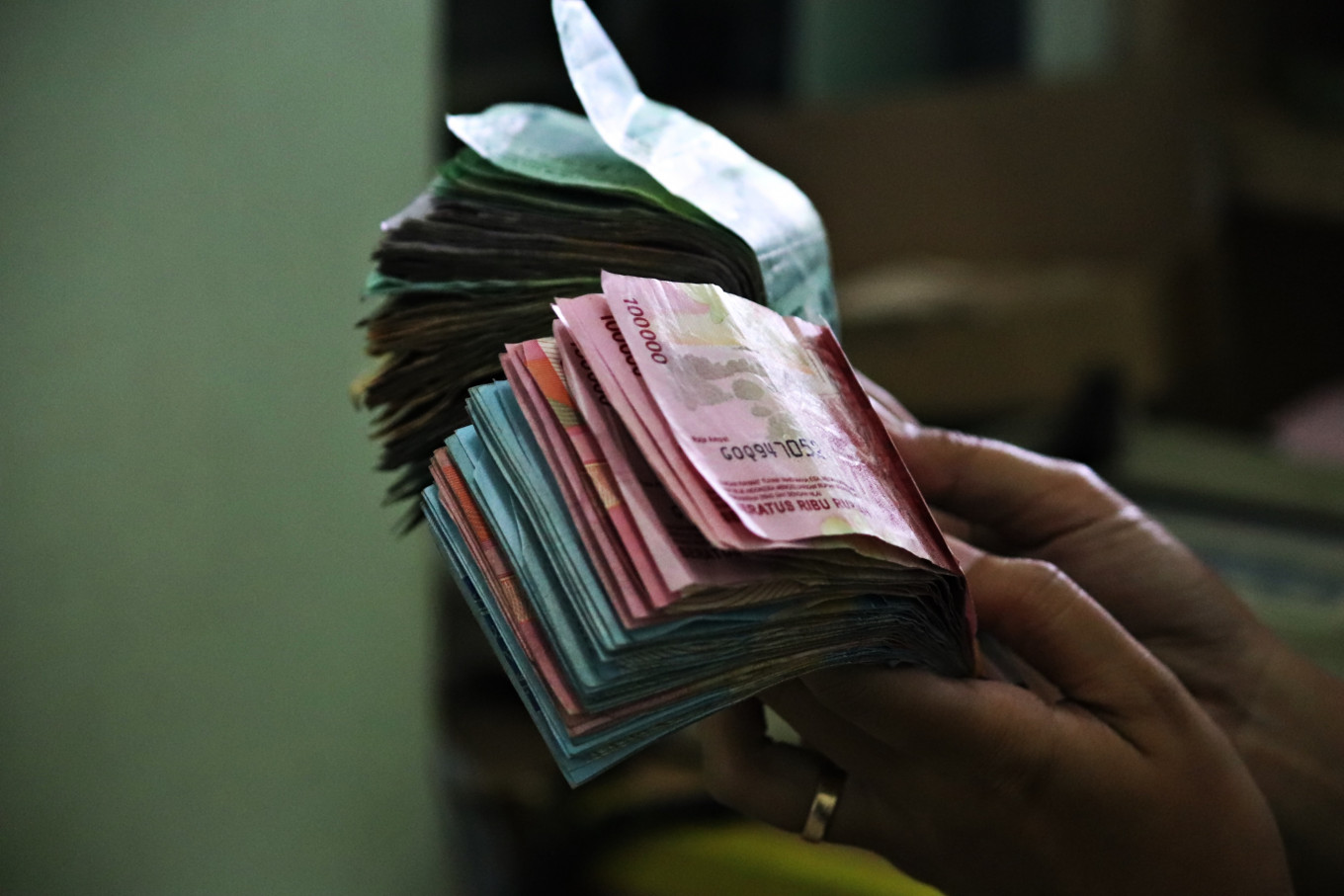Popular Reads
Top Results
Can't find what you're looking for?
View all search resultsPopular Reads
Top Results
Can't find what you're looking for?
View all search resultsDebt collectors: The other side of a misunderstood occupation
Due to its association with violence, debt collecting is arguably one of the most vilified professions. Forced confiscation by debt collectors is a story one often hears. That being said, behind the job are people trying to survive and feed their families.
Change text size
Gift Premium Articles
to Anyone
D
ue to its association with violence, debt collecting is arguably one of the most vilified professions. Forced confiscation by debt collectors is a story one often hears. That being said, behind the job are people trying to survive and feed their families.
Debt collection is closely associated with violence, making the job of a debt collector one of the most hated. Indeed, debt collectors can go as far as endangering others' lives. In 2018, debt collectors in Jakarta reportedly kidnapped a 14-year-old girl because her parents had fallen behind in repaying their motorcycle credit to a finance company. Many other similar incidents involving extreme intimidation tactics by debt collectors abound.
Of course, debt collectors should never, actually, go that far. At least according to Bagus, who shared only his nickname. He said he had worked at various leasing companies for 15 years since the age of 25. At 42, the resident of Surakarta, Central Java, is now a lawyer at his own law firm.
Bagus said debt collectors had a bad reputation because many resorted to violence to collect arrears. "[Leasing companies] would never instruct debt collectors to resort to violence — yet many do so anyway to speed up the collecting process. That is because debt collectors receive quite a fee from every debt and unit collected and confiscated," the former head of recovery at a leasing company said.
Kristanto, a long-time freelance debt collector from Klaten, Central Java, confirmed what Bagus said. He insisted that debt collectors were instructed not to resort to violence.
"I have been working as a freelance debt collector at an [automotive leasing company] since 2009. I tour the city [to visit] those who have been behind on their payments for months. I am not paid a fixed salary. I earn money based on the number of [automotive] units I retrieve," Kristanto, who preferred to be addressed as Kris, said.
"[I] do not always confiscate the items of arrears. The debtors are welcome to negotiate, especially if they are cooperative. If that is the case, the debtor will be charged a fee, which is usually 15 percent of the price of the items. The money goes into the debt collector's pocket. [As I said], the debtors can negotiate the amount until we reach an agreement."
Kris is an external debt collector — someone who knocks on people's doors to collect their debts. Meanwhile, Bagus was an internal debt collector. His company would hire people like Kris to do the "dirty work". However, Bagus would also sometimes accompany the external debt collectors he hired to offer debtors a "win-win solution".
"Not all debtors have to face harsh debt collectors. It depends on how late they are in paying their debts. During the first 30 days of arrears, the debtors are still taken care of by internal debt collectors. Starting from the 31st day, we enter what is called the remedial [stage]. After 61 [days], we hand the case over to an external debt collecting company. Then, after the seventh month, we enter the recovery stage, where the debtors are offered an alternative solution to pay their debt if they want to keep their items of arrears," Bagus said.
There are limits: Bagus insisted that forced confiscations of items are illegal and such procedure shall undergo certain legal processes. (Courtesy of Bagus) (Courtesy of Bagus/Courtesy of Bagus)Association with violence
Kris claimed that the terrible reputation of debt collectors came from the fact that many excessively extorted money from debtors. Bagus said this was against what his companies used to instruct.
"We always briefed [our debt collectors] not to resort to violence, not to intimidate the debtors and not to break the law. Debt collectors [at my former companies] were [government] certified. They were not just random thugs. The certification is provided by the state," Bagus said.
Bagus also said that forced confiscations were often illegal. Debtors should plead in a hearing before the trial rules that their items of arrears are to be retrieved by the company they owe money to.
"There are still many who are not aware of the correct debt-collecting procedure, resulting in people falling victim to unlawful confiscations," Bagus continued.
Commonly known as “matel”, a portmanteau of mata elang (eagle eyes), debt collectors usually have a network of people who track the number plates that are late at random to be later inspected and forcibly take the leased unit. The Constitutional Court, however, has instructed that even with fiducia (trust), there are certain procedures for recovering leased assets if the debtor is unwilling to give up the items.
Companies should submit a request to the head of a local district court who would send an aanmaning (warning to the debtor), which will then be followed up with an executorial beslag (execution order) to a bailiff should the debtor decline to voluntarily give up the asset.
"It is unacceptable to use violence in this day and age. I always operate with the correct procedure. I approach and explain to the debtors [about their debts] politely so they will not turn hostile, but everyone is different, and not all debt collectors agree [with my method]," said Kris, who had been a debt collector since 2009, saying that violence was not among his company's code of conduct.
"I urge the public not to generalize debt collectors — not all of us are evil. It differs from one debt collector to another."
Different approach: Kristanto said violence in debt collecting was never acceptable. He said he always approached debtors politely. (Courtesy of Kristanto) (Courtesy of Kristanto/Courtesy of Kristanto)Accreditation and protection
On top of his wish that the public stop demonizing debt collectors, Kris also pleaded that leasing companies be more understanding toward debt collectors considering the risks associated with their job.
"Our job carries a high risk. More often than not we have to deal with local thugs because many debtors pay them to protect themselves from us," Kris revealed. “I really wish we were paid a fixed salary [remembering the risk we have to face].”
Based on the Indonesian Financial Services Authority (OJK) Regulation No. 35/POJK.05/2018 on financing company business operations, everyone who is in charge of collecting debt lent by a finance company should hold certification published by the relevant authority. In Indonesia, the appointed organizer of such certification is PT Sertifikasi Profesi Pembiayaan Indonesia (SPPI).
“Our company would register anyone related to asset recovery with the SPPI. We would get a training module and then we need to pass the test,” said James, not his real name, an asset recovery staff in a leasing company in Jakarta. “The same goes for our asset recovery vendors as well. They need to have a vendor contract with a finance company that is willing to be some sort of guarantor to apply for the certification because it is only provided for finance companies, not service bureaus or law firms or the like.”
With this certification, debtors are protected because violence from debt collectors is not allowed and sanctions could be imposed on the company where they work if it occurs. At the same time, debt collectors are also protected since they have valid standing to do their job.
“Believe it or not, we had to bail a lot of our vendors from the police because debtors would report them under the accusation of theft and even robbery when they committed no violence at all. With clear identification through certification, on top of the Power of Attorney and asset recovery contract, it is easier for them to defend themselves.”
ohmg












